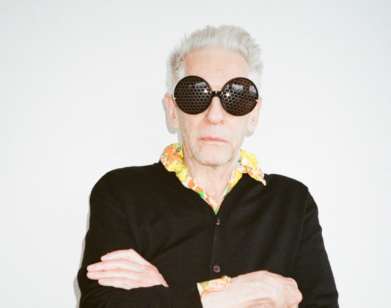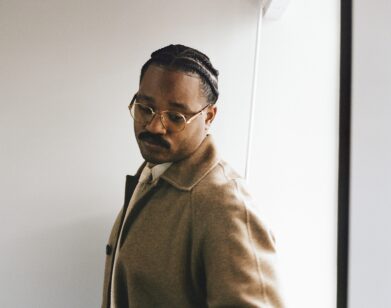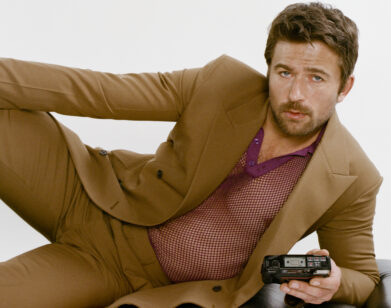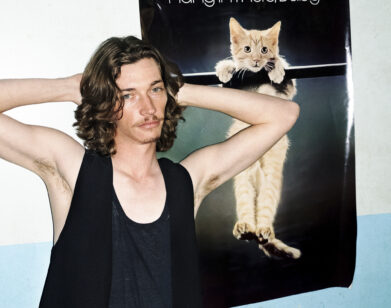Aaron Eckhart Without Ego
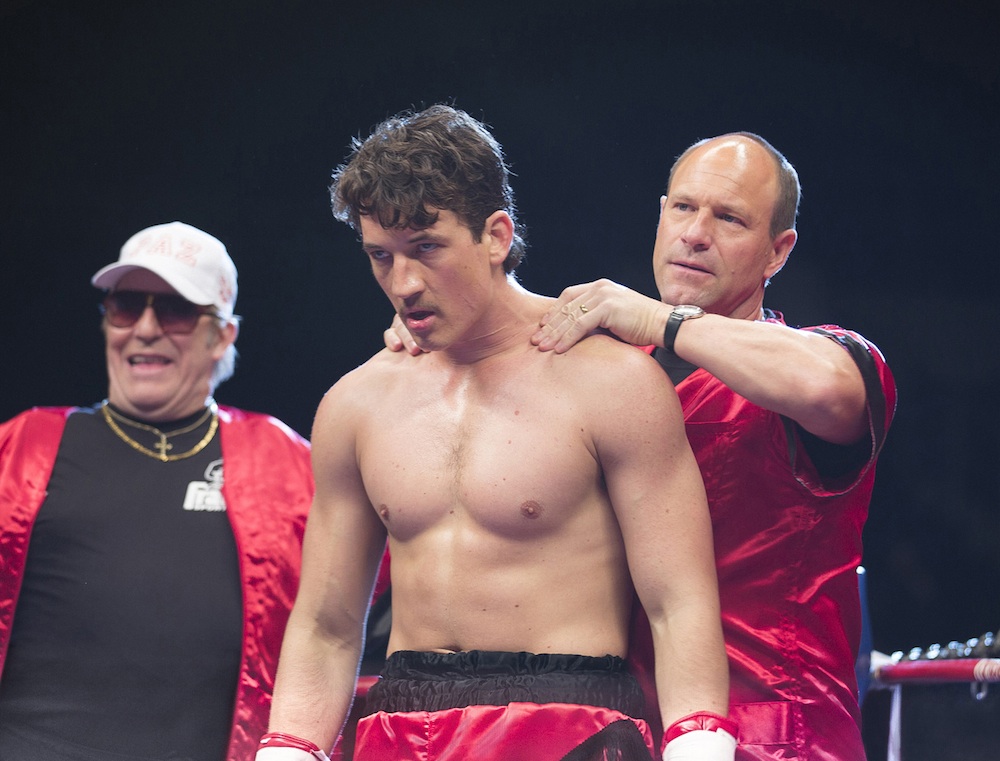
MILES TELLER (CENTER) AND AARON ECKHART (RIGHT) IN BLEED FOR THIS
“Oftentimes in movies, actors are playing very disagreeable, cantankerous, unattractive characters,” Aaron Eckhart says. “If you’re supposed to be in character all the time you’re going to do things that are going to displease people or make people uncomfortable—but you’re going to get a better performance. You have to weigh and balance: is it worth me pissing everybody off and having a reputation as a disagreeable person?” he continues, speaking over the phone from L.A. “If there wasn’t so much pressure to be a good guy then you’d get better performances from people.”
The cantankerous character Eckhart is referring to—and playing—is Kevin Rooney, the longtime boxing trainer who coached Mike Tyson early on in his career. In Bleed For This, we see Rooney at his lowest: drunken, overweight, gambling, and certainly disagreeable. When the accomplished and eccentric boxer Vinny Pazienza (Miles Teller) breaks his neck in a horrifying car crash, the pair find redemption in one another through Pazienza’s hard fought return to fighting form, despite doctors’ uncertainty over if he’d ever walk again.
In order to portray the aging coach, Eckhart gained weight, shaved his head as if his hairline had receded, stuffed tissues up his nose to capture the nasal sound of a Rhode Island accent, and rarely broke character or spoke to his family or friends during the film’s shoot. While classically gruff—as what boxing trainer isn’t?—his performance provides a necessary, sobering presence to balance out the possessed rage and passion of Teller’s Pazienza. While maybe not always likable, the duo provides a compelling exploration of the violence, fervor, and highs and lows of boxing.
ETHAN SAPIENZA: I read that you originally wanted to be a songwriter, is that right?
AARON ECKHART: Yes sir.
SAPIENZA: Were the arts something that always compelled you?
ECKHART: Yeah. My mother and her mother are writers and poets. [When] I was about 14, I was going to rugby practice and they had auditions for a Charlie Brown musical. Because there was no competition I got Charlie Brown. It all started there. I knew I wanted to be an actor then. I just started doing plays in high school. No one in my family is in the business. Nobody encouraged me. I went to school and then went to university and got a film and acting degree. I moved to New York and didn’t get my real first film role until I was 27, which was In the Company of Men. It definitely was not in my family zeitgeist for sure.
SAPIENZA: Were you still writing music while trying to become an actor?
ECKHART: Oh yeah. I continue to write songs. I guess I got that from my mom—my love for words and images, creating feelings with words—the challenge of that. I’ve always been interested in that—the challenge of making songs.
SAPIENZA: Do you find there’s any overlap between songwriting and acting?
ECKHART: I always have a guitar on me when I’m in my trailer. I’m always writing songs, and definitely when I’m doing a character and need to get into a mood I use music to do that—whether it’s an aggressive mood or a sad mood.
SAPIENZA: I understand you box. How did you get your start with it?
ECKHART: When I did Erin Brokovich I figured, “Hey man, if I have to be in shape in this business then I’m going to learn a skill.” I started boxing then and I haven’t quit. I do something with boxing pretty much every day—like shadow boxing. I was in the gym yesterday. It really worked out well for this movie. As a trainer you have to know how to move your feet and what looks good and how to use the mitts and all that stuff. I had a pretty good education coming into the movie.
SAPIENZA: Did your experience in the sport make you want to do a boxing movie?
ECKHART: Yeah. I boxed a little bit in The Black Dahlia. I would still like to do a boxing movie where I was the fighter, but I’m 48. But then Mickey Rourke is older than me and he’s actually a boxer! It can be done. I love the fight game. I like the brutality. I like the mentality. I like the aggressiveness, but I like the technique and skill. I like the stakes. I like the people around in the gym. I like the everyday, working class feel of a boxing gym.
I was in Freddie Roach’s gym yesterday. He took me through his training camp with [Manny] Pacquiao and [Timothy] Bradley. That’s how I did my research for this. I went back in and said hi to him yesterday. He’s training another fighter. It’s stripped of all ego in that place. It’s so refreshing: it’s not about how you look; it’s not about your hair; it’s not about your muscles. It’s all about the fight game and that’s the only thing that counts. There’s a humility and a certain charm about that. People talk real. They’re not bullshitting you. I like to be around those kind of people.
SAPIENZA: Do you find that boxing mentality informs your acting at all?
ECKHART: Oh, I don’t know. Like anything at the top level, one day you’re up and the next day you’re not. That’s what this movie is about: guys coming back. I like those stakes. That what I love the most about the movie business: it’s one of the last businesses where if you don’t cut it you’re out. On a movie set you can see Bill will be there the one day and the next you say, “Where’s Bill?” They say, “Bill wasn’t doing his job. He’s out.” It’s that intense. That’s the same thing about the gym. You drop your hands once [and] you’re out. You don’t pay attention or you don’t make weight, you basically are going to lose your livelihood.
SAPIENZA: I find it really interesting that boxing movies are the utterly dominant subgenre of sports films, despite how boxing’s popularity has decreased.
ECKHART: I think it’s a singular sport, because the stakes are so high and because it just appeals to people’s primal instincts. It’s a life and death sport, and it’s a sport of sacrifice. Like I said, it’s a humbling sport, and people are coming from humbling circumstances. It’s always fun to watch a person that’s come from nothing to having everything and losing it again. That’s what happens in this movie basically. Or Rocky, Sylvester Stallone is the underdog; he’s the comeback story, he’s been counted out, just his hard work and determination get him through. It’s the same thing with Vinny. Vinny breaks his neck and against all popular opinion—family, doctor, trainer—he’s in the gym lifting weights with a Halo [device] on his head. Normal people don’t do that. Normal people listen to their doctor.
SAPIENZA: What was your research process like for playing Kevin?
ECKHART: Well Kevin is in the hospital with dementia [so] I didn’t have contact with him. Like I said I went through the training camp with Pacquioa. I also trained with Kevin Rooney Jr. His dad trained him as a boxer. Luckily Kevin Jr. has an extensive video library of his father being Tyson’s trainer and his own fights. He interviewed a lot so I got that off the internet.
SAPIENZA: Did you feel pressure to capture him accurately?
ECKHART: Always. Physically—to look like him and to sound like him. Anything I improvised it came from Kevin’s language verbatim. I listened to so much tape of him talking that anything I said in the movie that wasn’t scripted was actually what Kevin would say. That really helped me out. To this day, I could just start talking [like Kevin] and do entire interviews that I listened to of him. I always had him in my ear, in my phone. I was always watching, always talking in his voice. The thing about Kevin is when we see him he’s at the bottom of his game. He’s been drinking and gambling. His posture—everything reflects the fact that he’s been betrayed. He’s down. When he’s with Vinny he energizes himself. All that stuff helps and is real.
You have respect and reverence for your characters and the fact that you’re going to epitomize that person for the rest of their lives. They’re going to be judged based on your performance by millions of people. You have a certain responsibility. I tried to match what Kevin looked like at that time, which was overweight. It wasn’t something I did because I wanted to show off. It wasn’t about ego; it was about how do I look like this guy? I’m a relatively skinny, in shape or whatever. I quit working out and started eating cheese pizzas and just gained the weight.
SAPIENZA: What was your rapport like with Miles Teller? Did you try to have a trainer-trainee relationship?
ECKHART: Yeah. I tried for that right off the bat. When we got to Rhode Island, he had his own trainer. They were going through their fight choreography when I walked into the gym and I was in character. I would start coaching him, even when his coach was coaching him! He was like, “Who is this dude?” I wanted to create trust with Miles. I wanted to get him used me to touching his shoulder, touching his arms, giving him water, telling him off, giving him instructions so that when we came to shoot it would be second nature. I was the only one who was going to do that. I tried to not let anyone else get him water. When he was boxing in that scenes and I was around I’d be the one [to get it for him]—even if I were off set. I’d always be calling him champ, saying little things in his ear, patting him on the ass, all that sort of stuff. That’s how we’re going to sell these characters. If we’re going to do that then the audience is going to buy into the whole picture.
BLEED FOR THIS COMES OUT THIS FRIDAY, NOVEMBER 18, 2016.

